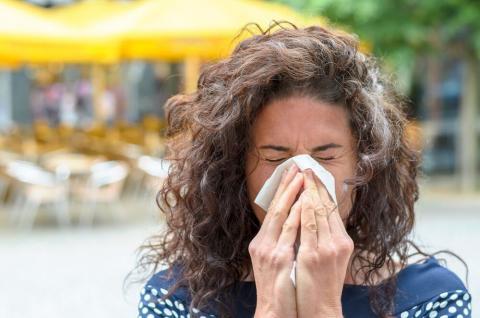
Come spring, pollen is in the air and allergies may start bugging you. Even though allergy symptoms are unpleasant, who wants to take a bunch of pills, eye drops, and nasal sprays to get rid of them? Here are a few holistic ways to treat seasonal allergies instead.
Eat raw local honey
If you suffer from spring or fall allergies, you may want to consider eating some local raw honey. It may sound strange, but when honey is harvested as close as possible to where you live, it can help you build an immunity to seasonal allergens. Currently, research is being done to back this theory up, but a lot of people have claimed local raw honey provides allergy relief (including me!). Come allergy season, I recommend eating a spoonful of it morning, noon, and night for the best results. The science behind doing this is fairly simple: Allergies are triggered by continuous exposure to the same allergen repeatedly over time. If you spend too much time around a certain plant, it can potentially become an allergenic, even if it's not allergenic initially. This is where honey comes into play: Honey made from bees in the proximity of the plant can act as a sort of vaccine (if taken in small amounts of course). Tiny amounts of pollen from the allergenic plant will be found in the honey, producing this vaccine-like effect. All you have to do is take a few tablespoons of it each day. Do some research into what honey is local to your area and make sure it's raw. There's a huge difference between store-bought honey and raw local honey. Most store-bought honey is "ultra-filtered" through heat and pasteurization, a process that destroys the beneficial pollen, compounds, and enzymes that make honey so great (and help alleviate allergies). Look for local raw honey that's not treated with heat: It should be buttery and look more solid and opaque than most of the honey you find in stores. The flavor is incomparable too. You'll notice the difference right away and won't want to go back—trust me.
Drink apple cider vinegar
Add allergies to the list of ailments apple cider vinegar can help with. The healthy bacteria found in apple cider vinegar supports healthy immune systems and lymphatic drainage. This helps fight off seasonal allergies, but only if taken on a regular basis. You can't expect to drink it once a week and be cured. While drinking apple cider vinegar may not sound too appealing, there are ways to take some of the sting out of it. You can add two tablespoons of apple cider vinegar to water or add one tablespoon and some fresh lemon juice to a glass of water. Whatever you do, make sure to drink it at least once a day when your allergies start acting up.
Invest in air purifying plants
Certain plants are great at filtering the air, a key component of keeping seasonal allergies far, far away. I recommend trying out a bunch of different plants and seeing what works best for you. Personally, I keep one pathos plant in my bedroom and it has lasted me years. I'm convinced it keeps my seasonal allergies in check (especially when I'm in my bedroom, since that's where it is). Pathos is nearly impossible to kill (I water it about once every two weeks or so, maybe a little more often if it droops) so it's great for people without green thumbs. Other plants that purify the air include (but are not limited to) aloe, snake plant, chrysanthemum, and gerbera daisy. These plants improve air quality all while brightening up your home. What more could you ask for?
Clean your house naturally
Believe it or not, a lot of conventional house cleaners contain artificial fragrance, a known irritant that can provoke allergies. I'm not sure about you, but whenever I smell an artificial cleaner (whether in a bathroom or in a kitchen) I start to sneeze uncontrollably. It's not the best feeling in the world. That's why I like to use natural cleaners that still do an amazing job and keep my nose happy. It's super easy to make your own non-toxic cleaning products from simple ingredients. One of my favorite ways to clean is by making orange peel vinegar cleaner. You just fill a glass jar with orange peels, cover it with white vinegar, cap it, and let it sit in a cool dry place for 2 to 3 weeks. After that, you filter it into a spray bottle. You can choose to add any essential oils you like (I added some lemon) and then you can use it on just about anything. I use it to wipe down the stove and countertops and dust my room.
Take your shoes off as soon as you come home
When it's beautiful out, naturally you'll want to spend time outdoors. But when you get inside, chances are your shoes will be covered in potential allergens, especially if you've walked on grass. It's always best to leave shoes at the door, as you don't want to trek through the house and spread these allergens everywhere. (Switching into slippers or keeping your socks on is fine.) If your shoes smell bad after spending time outdoors and upon removal, consider deodorizing them naturally by using baking soda, salt, vinegar, or rubbing alcohol. If the pollen count was particularly high that day, it might be a good idea to completely change your clothes, putting the old ones in the wash, and even going so far as to take a shower. This will remove any potential allergens from sticking to your clothes and skin, so you don't bring them indoors with you.








